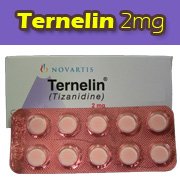
How Ternelin Works?
Ternelin is a centrally acting skeletal muscle relaxant. Spinal cord is its principal site of action. By stimulating presynaptic α2-receptors, it inhibits the release of excitatory amino acids that stimulate N-methyl-D-aspartate (NMDA) receptors. Polysynaptic signal transmission is inhibited at spinal interneuron level (which is responsible for excessive muscle tone) and muscle tone is reduced. It also exerts moderate central analgesic effect.
What is Ternelin Used For?
Ternelin is a short acting drug used for the management of spasticity.
Painful Muscle Spasms
- Painful muscle spasms associated with static and functional disorders of the spine (cervical and lumbar syndromes).
- Painful muscle spasms following surgery e.g. for herniated intervertebral disc or osteoarthritis of the hip.
Spasticity Due To Neurological Disorders
- For example degenerative spinal cord diseases, chronic myelopathy, multiple sclerosis, cerebral palsy and cardiovascular accidents.
Ternelin Dosage
- Relief Of Painful Muscle Spasms
The dose of Ternelin tablet is 2 to 4 mg thrice a day. In severe conditions, an extra dose of 2 or 4 mg may be taken at night. - Spasticity Due To Neurological Disorders
The initial daily dose may be increased stepwise at half-weekly or weekly intervals by 2 to 4 mg but initially it should not exceed 6 mg, given in 3 divided doses. The optimum therapeutic response is achieved when daily dose is between 12 and 24 mg, administered in 3 to 4 divided doses. The total daily dose should not exceed 36 mg. - Use in children
The use of Ternelin Tablets in children is not recommended. - Use in elderly patients
Caution should be taken while using Ternelin in elderly patients because renal clearance may be significantly decreased in these patients.
Contraindications
- Ternellin is contraindicated in patients with known hypersensitivity to any of its ingredients.
- Concomitant use of Ternelin with fluvoxamine is contraindicated.
- Ternelin should be used only with extreme caution in patients with impaired hepatic function.
Related Links
Leave A Comment